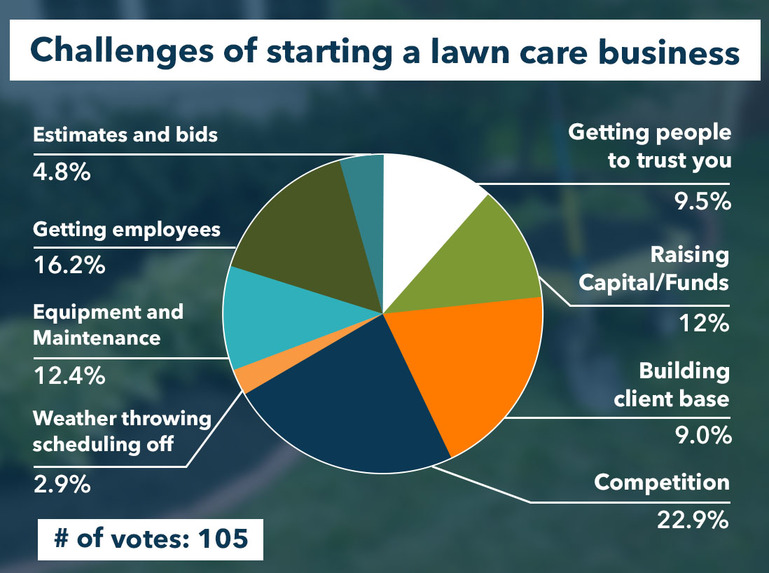Competition Challenges:
30% of Lawn Care Professionals Express Concerns A sixteen-year-old unloads his dad’s push mower and walks up to the door of Mrs. Carlson’s house, his first client. His mind is preoccupied with how to start a lawn care business.
A sixteen-year-old unloads his dad’s push mower and walks up to the door of Mrs. Carlson’s house, his first client. His mind is preoccupied with how to start a lawn care business.
“Craig,” Mrs. Carlson says over the wailing screen door, “thanks for coming! Sure is nice out today.”
“Yes mam,” he says, “I can’t wait to get work.”
Grass flies as Craig does his work, but all he can see are dollar signs; a $20 bill and a glass of sweet iced tea are more than he could have ever hoped for. Now Craig is thirty years old, has more than 20 employees, and runs a seven-figure lawn care and landscaping business. That’s the dream, right?
It’s the kind of story told time and again by lawn care professionals. It’s like a Horatio Alger plot — rags to riches. But for every success story, there are ten more shuttered businesses. Untold tragedies. Creating a lawn care business is hard work. We surveyed 105 lawn care professionals and asked them, “What’s the most challenging part about starting a lawn care business?”
Acknowledgment of survey responses
We recognize the intertwining nature of business. Competition impacts building a client base. So does budgeting for marketing. For the survey, we limited survey-takers to one response. Still, we acknowledge that starting a lawn care business presents many nuanced challenges — many of which may be a symptom of a more significant root cause.
Key Takeaways from the Survey |
|
Here’s a summary of the most interesting statistics: # Competition was mentioned as the most challenging part of starting a lawn care business at 22.9% # Right behind competition, 19% of respondents cited building a client base as a challenge # 16.2% said getting employees is the toughest part of launching a lawn care business |
The competition is tough; the market is oversaturated
Anyone who can get a mower from point A to point B can win a client. This makes the lawn care industry highly saturated. There are more than 600,000 landscaping businesses in North America. Scaling a lawn care business remains a steep challenge.
The equipment needed to scale a lawn care business is pricey. Add employees. That means workers' comp, payrolls, taxes, and more. 
No company, however, owns more than five percent of the market; 40 percent of homeowners need lawn care, too, so there are opportunities. But markets vary. One area may have many well-established lawn care companies, and others may be easier to break into.
Either way, respondents noted competition is a considerable challenge when starting a lawn care business.
Tips to stand out from competitors
Build a holistic marketing plan
The competition is tough, and at first, it can be hard to differentiate a business. Create a marketing plan that involves traditional, print methods and digital channels.
Flyers, business cards, and door hangers have good returns on investment, even in the modern world. But, businesses still need an online presence. Having a professional website builds trust with clients. It’s a prospect’s first impression of a company. Build a brand and culture that values professionalism.
Read and learn, constantly
A business owner that learns all about the plants, trees, grass, and soil in an area can differentiate themselves from competitors. Word travels fast. Knowing that the average homeowner spends more than $500 a year on lawn care, a business that provides valuable insights will increase their worth and profitability.
Find ideal clients
One of the most challenging aspects of running a business is dealing with customers. Some will be difficult. Many will be great – they’ll communicate well, pay on time, and leave you positive reviews. Focus on them. What is it about these clients that works so well? These are a business’s ideal clients. It's not necessary or feasible for a starting lawn care business to create a full-fledged buyer persona, but looking at the list of clients who seem to ease into operations would be wise.
Is there overlap in demographic information, neighborhood, or the types of professions a business gets most of its clients from? This data helps businesses scale. It alleviates the pain of having too many poor-fit clients – although, all businesses will have to deal with difficult people to some degree – and will help a business create a unique company culture and client base.
Value customer service
A business must deal with people. People are difficult. Maintaining a positive attitude and learning a customer service skill set is important to grow a business. Again, word travels fast. In a matter of seconds, a client can leave a negative review or tell a friend about their poor experience. Sometimes, this happens despite a company’s best efforts to help the client.
Some people will be unhappy by default. However, it’s worth investing in training. Many other people will come off as rude. But why? Maybe it’s more than a sour disposition. They may have been burned by another lawn care provider.
Or, something in their personal lives may spill over into their business conversations. Either way, excellent customer service can make a big difference. Respond promptly. Avoid ego clashes. Be clear and reread the written communication. Speak and write professionally (and invest in editing software like Grammarly if that's not a strong suit).
Building a client base is a challenge
Starting out, it’s difficult to land clients. Why? Competition, locality, marketing, and trust are a few of the top reasons. These are often intertwined. As mentioned before, the lawn care industry is highly competitive. Many established lawn-care companies are already in business, all contesting for the same prospective clients. Established companies can typically boast brand recognition and upsell their pre-existing client bases.
They also hold vast marketing budgets, making it hard for newer businesses to break through their influence. Developing a relationship of trust with prospective clients takes time. Solo-preneurs will find it harder to persuade clients to take on a new service, as opposed to using an established provider with a tried and respected name.
These businesses must also consider customer acquisition costs. Finding new customers is neither easy nor cheap. Those invoices for advertising, promotions, and salespeople add up. Growth is tough.
The seasonality of the industry compounds this issue. In most places, demand increases in the spring and summer growing seasons. Everyone’s outside. But what about when winter hits? How new businesses weather the slower months is a challenge. They'll have to save wisely and upskill to provide new services.
Another challenge arises: adhering to local ordinances and obtaining the necessary licensing. Businesses providing basic lawn care like mowing, weed eating, and hedge trimming won’t need any licensing outside of what’s needed to be filed in their state as a limited liability company (LLC) or other type of corporation. Those looking to add more services like tree trimming, applying pesticides, or landscaping contractor jobs, will need to check their state laws.
LEARN MORE: GreenPal experts break down what licensing lawn care companies might need based on service and state.
Tips to build a client base
Lean on word of mouth advertising
According to Nielsen, 92 percent of consumers worldwide say they trust friends and family above all other forms of advertising. It is no surprise then that word of mouth is the primary factor behind 20 to 50 percent of all purchasing decisions.
When lawn care professionals do an excellent job, word spreads. Social influence remains a top marketing strategy for businesses. This word of mouth can also occur within the digital realm, on review sites, and a Google Business Page.
Use an application like GreenPal to build your client base
There are a couple of things needed to list a business on GreenPal:
|
|
|
|
Once the application is completed the application process, a business is well on their way to earning clients. You can make bids and begin building your brand and influence.
Adding and managing employees proves a tall task
Hiring employees presents numerous challenges. Not only will a business owner need to vet whether or not an employee is trustworthy and a good fit for the company culture, there’s a laundry list of items to cross off to onboard new hires. Lawn care professionals will need to secure insurance and take care of things such as worker’s compensation.
How will a business owner handle workplace disputes? There are many hats to wear. A lawn care professional just starting is a small business owner. They’re a human resource officer; they’re the legal team; they’re the marketing and sales director; and, they’re the accountant. That’s only a few of the roles they’ll fill.
A business will need processes in place to handle information like social security numbers (SSN), an employee’s eligibility to work (IRS Form I-9), and the documentation needed to deduct income taxes (IRS Form W-4).
It can be hard to strike the right balance between paying what it takes to get a top-notch employee and burning through a budget. On one hand, paying the bare minimum helps a company maximize profit margins but at a higher risk. A terrible employee making poor decisions can cost a company more in the long run. On the other hand, hiring the crème de la crème costs a pretty penny. Maybe not the best option for a scaling company.
It’s best to proceed with caution.
It’s much wiser to spend the money to hire good people. As mentioned before, word of mouth is everything. One employee going above and beyond and making relationships with clients will offset the costs it takes to have them on your team.
These are the types of employees who earn good reviews and develop client relations and upsell services by being proactive.
Tips to hiring and managing employees
Determine the type of employees you need
First, decide what types of employees you need. Are you in need of full-time field workers or seasonal help? Starting with part-time field workers is a great starting place. This approach can help a business owner offload tasks, freeing up time. It can help an employer gauge an employee’s work ethic, professionalism, and commitment to the role before hiring them full time. Another benefit is that it helps owners build the onboarding and training infrastructure needed to scale.
Create great job descriptions
One of the most important aspects of the hiring process is the job description. Business owners should be very specific of what they’re looking for in a new hire. Clearly communicate the requirements and experience needed for the position. Toss out resumes that don’t match the criteria. Write a clear summary of the position. What are the responsibilities? Who is your ideal candidate?
Make these things apparent.
Conduct professional interviews
Once its business has pinpointed their top candidates for the position, conducting interviews is the next step. Make sure any individual being considered for the role provides professional references. Contact them. They may validate the candidate's credentials. Or, their take may save a lawn care business the trouble of hiring someone who is one thing on paper and another out on the job. Once a company has the right employees, they are ready to scale. More work. Better results. Greater returns.
Quick Summary
Challenges |
Tips to Overcome |
Competition |
- Build a holistic marketing plan combining traditional and digital methods. - Constantly learn and improve to stand out from competitors. |
Building a client base |
- Leverage word of mouth advertising for trust and credibility. - Use platforms like GreenPal to expand your client base and streamline operations. |
Hiring and managing employees |
- Determine the type of employees needed and start with part-time workers to gauge commitment. - Create clear job descriptions and conduct professional interviews. |
Starting a lawn care business proves a major challenge. In this survey, lawn care professionals shared their takes on the most challenging aspects of laughing and scaling a new business. Competition, building a client base, and hiring employees were a few of the top challenges noted.






![20 Insider Tips on Starting a Lawn Care Business [What they DON'T tell you]](https://greenpal-production.s3.amazonaws.com/pq1qjlqbm6jk767q4ru6egdddf5c)





